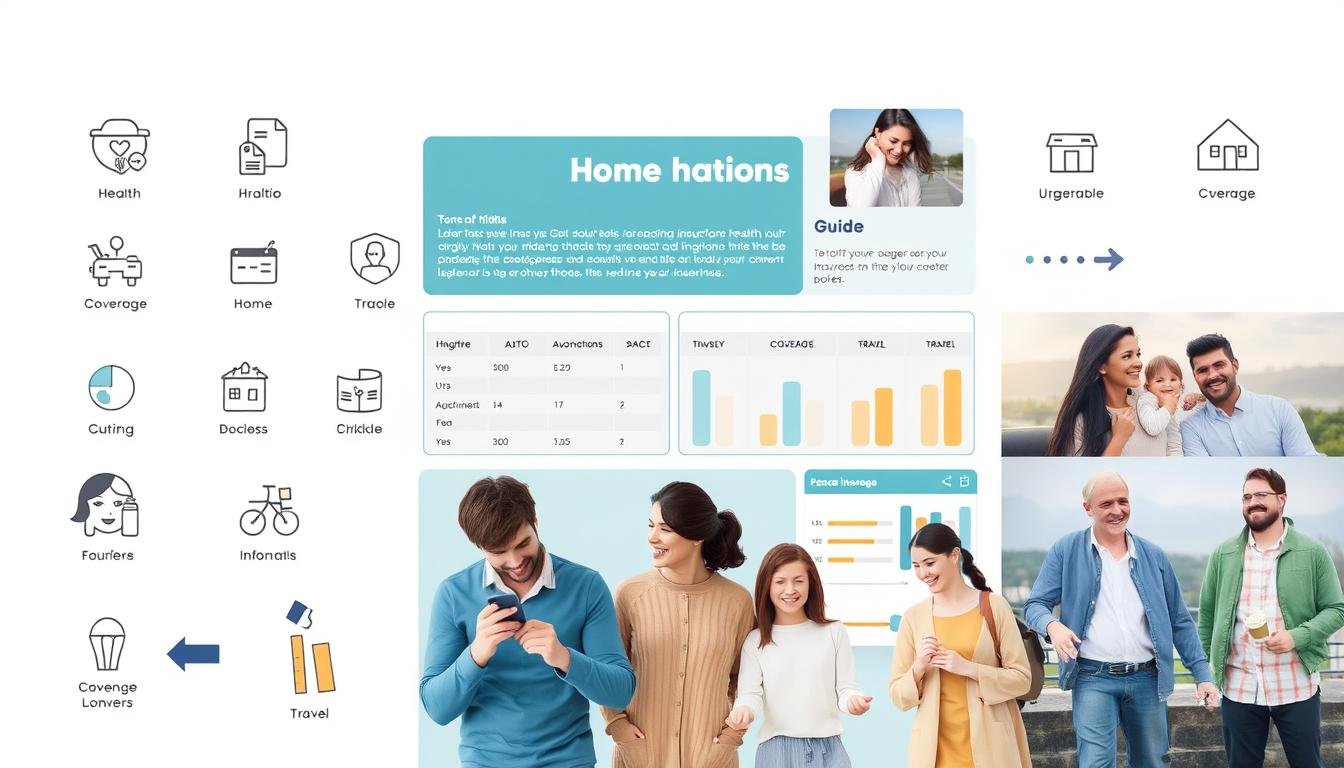Ensuring our financial security is more important than ever. In this guide, we’ll look at the various insurance options. We’ll cover health, auto, life, and liability insurance to help you protect your future and assets.
Key Takeaways
- Discover the different types of insurance policies and their importance
- Learn how to assess your individual insurance needs
- Understand the financial risks of being uninsured or underinsured
- Explore the coverage options for health, auto, homeowners, and life insurance
- Discover strategies for bundling insurance policies to save money
Understanding the Importance of Insurance
Insurance is a key part of managing life’s risks. It offers financial protection against unexpected events. This helps keep your finances stable and your well-being safe.
The role of insurance is huge. It can be the difference between facing a crisis or getting through it.
Why You Can’t Afford to Go Uninsured
Without insurance, you face big financial risks. Medical emergencies, property damage, or liability claims can quickly use up your savings. This can put you in a tough financial spot.
The costs of not having insurance are high. You might end up with debt, limited healthcare access, and even lose your assets.
The Financial Risks of Being Underinsured
Even with some insurance, being underinsured is risky. You might face unexpected expenses and not fully recover from a crisis. It’s important to understand these risks to manage your finances well.
Knowing the consequences of being underinsured helps protect your finances. It ensures you have the financial protection you need.
| Risk | Uninsured | Underinsured |
|---|---|---|
| Medical Expenses | Full responsibility for all costs | Partial coverage, leaving you liable for remaining expenses |
| Property Damage | Complete financial burden to repair or replace | Inadequate coverage leading to out-of-pocket costs |
| Liability Claims | Personal assets at risk | Insufficient liability protection, exposing your finances |
Understanding insurance’s importance helps you protect your finances. It’s key for effective risk management and personal finance planning.
Types of Insurance Policies
It’s important to know about the different insurance policies out there. They help protect you, your family, and your stuff. The insurance world has many products to handle various risks. Let’s explore the main types of insurance policies you should know about.
Health Insurance
Health insurance covers your medical costs. This includes doctor visits, hospital stays, and prescription drugs. Policies vary in what they cover and how much you pay out of pocket.
Auto Insurance
Auto insurance helps if you’re in a car accident. It covers damage to your car and liability for injuries or property damage to others. You can choose from liability, collision, and comprehensive insurance.
Homeowners Insurance
Homeowners insurance protects your home. It covers your home’s structure, your stuff, and liability if someone gets hurt on your property.
Life Insurance
Life insurance gives financial support to your loved ones if you pass away. It comes in term and whole life forms, each with its own benefits.
Disability Insurance
Disability insurance replaces your income if you can’t work due to illness or injury. It helps keep your finances stable during tough times.
Liability Insurance
Liability insurance protects you from legal and financial trouble if you’re found liable for damages or injuries. It covers both personal and professional liability.
| Insurance Policy | Key Coverage | Typical Uses |
|---|---|---|
| Health Insurance | Medical expenses, preventive care, prescription drugs | Routine healthcare, unexpected illnesses or injuries |
| Auto Insurance | Liability, collision, comprehensive | Protecting your vehicle and other drivers/property in an accident |
| Homeowners Insurance | Dwelling, personal property, liability | Protecting your home, belongings, and against lawsuits |
| Life Insurance | Death benefit, income replacement | Providing for your family’s financial security after your passing |
| Disability Insurance | Income replacement | Maintaining financial stability if you become unable to work |
| Liability Insurance | Legal liability, property damage | Protecting against lawsuits and financial loss due to your actions |
The right insurance policy options and insurance coverage options depend on your needs. The insurance industry offers many insurance products. Knowing about the different insurance policies helps you make smart choices to protect yourself and your loved ones.
INSURANCE: Selecting the Right Coverage
Choosing the right insurance can be tough, but it’s key to protect yourself. Whether you’re starting or reviewing your policies, take a detailed look. This will help you find the best coverage for your situation.
Assessing Your Individual Needs
First, think about what you need. Look at your age, family, assets, and how much risk you can handle. Also, think about your debts and financial goals. This will help you figure out how much coverage you need to keep your finances safe.
Factors to Consider When Choosing Insurance
When picking insurance, keep these points in mind:
- Coverage Limits: Make sure your policy limits are enough to cover you in case of a claim.
- Deductibles: Think about the balance between higher deductibles and lower premiums. Consider if you can afford the deductible if needed.
- Exclusions: Check what your policy doesn’t cover. It’s important to know what’s not included.
- Bundling Opportunities: Look into savings by getting multiple policies from the same company.
By carefully looking at your needs and these factors, you can make smart choices. This will help you pick the right coverage to protect your money.
| Insurance Selection Factors | Considerations |
|---|---|
| Coverage Limits | Ensure limits are sufficient to meet your needs in the event of a claim. |
| Deductibles | Balance higher deductibles with lower premiums, considering your financial ability to cover the deductible. |
| Exclusions | Carefully review policy exclusions to understand what is not covered. |
| Bundling Opportunities | Explore potential savings by bundling multiple insurance policies with the same provider. |
Health Insurance: Protecting Your Well-being
Health insurance can seem overwhelming, but knowing your options is key to your health. As an expert, I’ll guide you through the different plans. This will help you choose the right one for your health needs and budget.
Understanding Health Insurance Plans
There are many health insurance plans, each with its own benefits. Let’s look at the most common ones:
- Health Maintenance Organizations (HMOs) – These plans often have lower costs but you must use in-network doctors and get referrals for specialists.
- Preferred Provider Organizations (PPOs) – PPOs give you more freedom to see doctors outside your network. But, you’ll pay more out of pocket.
- High-Deductible Health Plans (HDHPs) – HDHPs have lower monthly costs but higher deductibles. They’re good if you don’t expect to use a lot of healthcare services.
| Plan Type | Monthly Premiums | Deductibles | In-Network vs. Out-of-Network |
|---|---|---|---|
| HMO | Lower | Lower | Only in-network providers |
| PPO | Higher | Higher | Both in-network and out-of-network providers |
| HDHP | Lower | Higher | Both in-network and out-of-network providers |
Knowing the details of each plan helps you make a smart choice. Your decision affects your health protection and healthcare costs.

Auto Insurance: Safeguarding Your Vehicle
Keeping your vehicle safe is a top priority. Auto insurance is key to that safety. We’ll look at liability, collision, and comprehensive coverage. These are crucial for your safety and your vehicle’s.
Liability Insurance: Your First Line of Defense
Liability auto insurance is the most basic and essential. It protects you if you’re at fault in an accident. It covers medical costs, legal fees, and repairs to the other vehicle.
Collision and Comprehensive Coverage: Protecting Your Vehicle
Collision coverage helps when your vehicle hits something. Comprehensive coverage protects against theft, vandalism, or natural disasters. These coverages offer peace of mind and financial security.
| Coverage Type | What it Covers | Importance |
|---|---|---|
| Liability Insurance | Bodily injury and property damage to others | Legally required in most states, protects you from financial liability |
| Collision Coverage | Damage to your vehicle in a collision with another car or object | Ensures your vehicle can be repaired or replaced after an accident |
| Comprehensive Coverage | Damage to your vehicle from events like theft, vandalism, or natural disasters | Provides all-around protection for your vehicle beyond just collisions |
Knowing about auto insurance helps you protect your vehicle. It also keeps your finances safe on the road.
“Auto insurance is not just a legal requirement, it’s a vital safety net that can shield you from devastating financial consequences in the event of an accident or unexpected incident.”
Homeowners Insurance: Protecting Your Investment
As a homeowner, your property is a big investment. Homeowners insurance is key to protect it from unexpected events. It’s important for both new and experienced homeowners to know what it covers.
What Does Homeowners Insurance Cover?
Homeowners insurance has several important parts. They work together to keep your home and finances safe:
- Dwelling Coverage: This part covers your home’s structure against damage from fires, storms, and vandalism.
- Personal Property Coverage: It protects your personal items, like furniture and clothes, if they get stolen or damaged.
- Liability Coverage: This helps if someone gets hurt on your property or if you’re legally responsible for damages.
- Additional Living Expenses: If your home is not safe to live in, this covers temporary living costs and more.
What your insurance covers can change based on your policy. It’s key to check your policy and understand what’s included. Talking to an insurance expert can help make sure you have the right homeowners insurance, home insurance, and property insurance.

“Homeowners insurance is a critical investment in protecting your most valuable asset – your home.”
Life Insurance: Securing Your Family’s Future
Life insurance is key to financial planning. It ensures your loved ones are financially secure if you pass away. There are two main types: term life insurance and whole life insurance. Knowing the difference helps you choose the best for your family.
Term Life Insurance: Affordable Protection
Term life insurance is simple and affordable. It covers you for a set time, from 1 to 30 years. It’s a budget-friendly choice for those needing family protection.
Whole Life Insurance: Lifetime Coverage
Whole life insurance gives lifetime coverage and a growing cash value. It costs more, but offers more benefits. It can grow in value and provide loans for emergencies or estate planning.
Choosing between term life insurance and whole life insurance depends on your needs and budget. A financial advisor can help pick the right life insurance for your family’s future.
Disability Insurance: Income Protection
Disability insurance is often overlooked but it’s crucial for your financial security. It provides income protection if you can’t work due to illness or injury. Understanding its importance ensures you have financial stability during tough times.
Disability insurance offers peace of mind. Imagine losing your main income due to illness or accident. Disability insurance can fill the gap, helping you cover essential expenses and keep your standard of living. This financial safety is priceless, especially for those who depend on their income to support themselves and their families.
Types of Disability Coverage
There are two main types of disability insurance:
- Short-term disability insurance covers you for a few weeks to months. It’s good for temporary medical issues that prevent work.
- Long-term disability insurance offers coverage for years, often until retirement. It’s great for chronic or severe disabilities.
Assessing your needs and risks helps choose the right disability coverage. Investing in disability insurance protects your income, ensuring financial security, no matter what the future brings.
| Coverage Type | Benefit Period | Average Monthly Premium |
|---|---|---|
| Short-Term Disability | 3-6 months | $30-$50 |
| Long-Term Disability | 2 years to retirement | $50-$150 |

“Disability insurance is the most overlooked type of coverage, yet it’s one of the most important. It can provide the financial security you need when you need it most.”
Liability Insurance: Avoiding Financial Catastrophe
Protecting your assets from legal action is key. Liability insurance helps with this. It keeps your finances safe from personal or professional liability claims.
Personal Liability vs. Professional Liability Insurance
Liability insurance can be confusing. But knowing the difference between personal and professional insurance is important. Personal liability insurance protects you from injuries or damages on your property or from your actions. Professional liability insurance covers you and your business from negligence or mistakes in your services.
Both types of insurance give you legal protection and reduce financial risk from lawsuits and liability claims. The right insurance can save you from a financial catastrophe.
“Liability insurance is the foundation of financial security in today’s litigious world. It’s not just a luxury, but a necessity for protecting your assets and safeguarding your future.”
For individuals or businesses, knowing about liability insurance is crucial. Choosing the right coverage for your needs means your assets are safe from legal action.
Insurance for Renters and Landlords
Renters need insurance just like homeowners do. Renters insurance protects your stuff, covers you if someone gets hurt, and helps if you have to move out temporarily.
Why Renters Need Insurance Too
Renters insurance is often ignored, but it’s really important. It helps replace your stuff if it gets lost, stolen, or damaged. It also covers you if someone gets hurt in your place, and helps if you can’t live there anymore.
Landlords only insure the building, not what’s inside. So, your stuff isn’t covered by their policy. Renters insurance is a cheap way to protect your valuables.
| Coverage | Renters Insurance | Landlord Insurance |
|---|---|---|
| Personal Belongings | ✓ | ✗ |
| Liability Protection | ✓ | ✓ |
| Temporary Housing | ✓ | ✗ |
| Building Structure | ✗ | ✓ |
Landlords need insurance to protect their property. It covers the building, liability if someone gets hurt, and lost rent if the place can’t be lived in.
Knowing about renters and landlord insurance helps protect your property and stuff.

Bundling Insurance Policies for Savings
Protecting yourself and your assets can be expensive. But, there’s a simple way to save money – policy bundling. By combining auto, home, and life insurance with the same provider, you can get big insurance discounts. This can lower your insurance costs a lot.
The idea of policy bundling, or multi-policy discounts, is easy. Insurance companies like it when you trust them with all your insurance needs. So, they offer big bundling insurance discounts to keep you as a customer.
- Typically, the more policies you bundle, the greater the potential savings.
- Bundling can provide discounts ranging from 10% to 25% or more on your total insurance premium.
- The specific insurance discounts offered may vary between providers, so it’s essential to shop around and compare your options.
Using policy bundling can really change how you manage your insurance costs. By combining your coverage, you can save a lot of money. This way, you get great protection for your personal and financial well-being.
“Bundling my auto, home, and life insurance policies has saved me hundreds of dollars each year. It’s a no-brainer for anyone looking to reduce their insurance expenses.”
To get these insurance discounts, you need to look at what different providers offer. Take time to think about what coverage you need. Then, compare the savings from different policy bundles. With some research and planning, you can save a lot by bundling insurance.
Reading and Understanding Insurance Policies
Insurance policies can be hard to understand because of their complex language. But, it’s key to know what your coverage includes. I’ll help you understand the main parts of an insurance policy. This way, you can make smart choices about your protection.
Common Insurance Terms and Definitions
Getting to know insurance-specific words is the first step. Terms like “deductible,” “premium,” “coverage limits,” and “exclusions” are crucial. Knowing these will help you review your policy well and make sure you have the right coverage.
It’s also vital to know the differences between various insurance types. For example, “term life insurance” and “whole life insurance” are different. So are “personal liability” and “professional liability.” Understanding these differences helps you pick the right policies for your needs.




1 comment